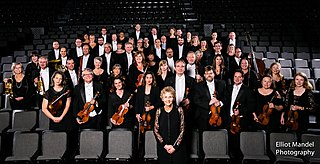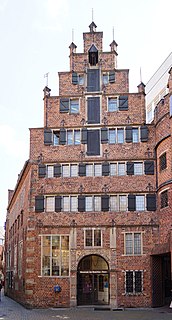Related Research Articles
Marcin Mielczewski was, together with his tutor Franciszek Lilius and Bartłomiej Pękiel, among the most notable Polish composers in the 17th century.

Weser Renaissance is a form of Northern Renaissance architectural style that is found in the area around the River Weser in central Germany and which has been well preserved in the towns and cities of the region.

Musikalische Exequien, Op. 7, SWV 279–281 is a sacred composition that Heinrich Schütz wrote in 1635 or 1636. Written for the funeral services of Count Henry II, Count of Reuss-Gera, who had died on 3 December 1635, it is Schütz's most famous work of funeral music. It comprises the following sections:
Philipp Dulichius was a German composer.
Manfred Cordes is a German conductor of early music, musicologist and teacher. He is professor at the Hochschule für Künste Bremen and was its rector from 2007 to 2012.
Michael Jacobi (1618—1663) was a North German composer and kantor.

Erasmus Widmann (1572–1634) was a South German composer.
Johann Müller was a German composer and organist.
Andreas Berger (1584–1656) was a German composer whose works featured in the collection of J. S. Bach. He was the son-in-law of the English emigre musician William Brade.
Johann Werlin (died ca. 1680) was a German Baroque composer.
Johann Hildebrand, also Hildebrandt was a German composer, organist, and poet.
Julius Johannes Weiland was a minor German composer.
Julius Ernst Rautenstein was a German composer.

Music of the Baroque is an American professional chorus and orchestra based in Chicago, Illinois.

The Ludwig Roselius Museum on Böttcherstraße in the old town of Bremen, Germany, houses the private collection of the successful coffee merchant Ludwig Roselius (1874–1943). Artefacts from the Middle Ages to the Baroque period are on display. The house itself which was completed in 1588 has a history going back to the 14th century.
Andrea Lauren Brown is an American soprano and second prize winner of the 2003 ARD International Music Competition. Often appearing as Andrea Brown, she has performed at international venues and festivals, and has made recordings of rarely played sacred music including cantatas by Christoph Graupner.
Harry Geraerts is a Dutch tenor. His repertoire includes the great oratorios, baroque operas, ensemble music and Lieder, especially in the field of Renaissance and Baroque music.
Klaus Bernbacher is a German conductor, music event manager, broadcasting manager and academic teacher. He co-founded the Tage der Neuen Musik Hannover, a festival for contemporary music, in 1958. He was manager for the broadcaster Radio Bremen from 1962. In Bremen, he was also a cultural politician, a member of the Bremische Bürgerschaft, and an honorary professor at the Hochschule für Künste Bremen.

The Bremer Philharmoniker is the official orchestra of the Free Hanseatic City of Bremen. In addition to the music theatre in the Theater Bremen they organise 28 Philharmonic concerts per season, various special, benefit and chamber concerts as well as many projects in the field of music education. Christian Kötter-Lixfeld is the artistic director of the Bremen Philharmonic Orchestra, and Marko Letonja has been its Generalmusikdirektor since the 2018/2019 season.
References
- ↑ Ensemble Weser-Renaissance Bremen on Deutschlandfunkkultur
- ↑ "Ensemble Weser-Renaissance Bremen". HFK BREMEN (in German). Retrieved 16 December 2020.
- ↑ SIGLO DE ORO – Musik aus Spaniens Godenem Zeitalter on hfk-bremen
- ↑ "Das Ensemble Weser-Renaissance unter der künstlerischen Leitung von Prof. Manfred Cordes". Pressestelle des Senats (in German). Retrieved 16 December 2020.
- ↑ "Ensemble Weser-Renaissance Bremen". MIZ (in German). 17 November 2016. Retrieved 16 December 2020.
- ↑ "Festkonzert zur Verabschiedung von Prof. Dr. Manfred Cordes". idw (in German). 6 June 2019. Retrieved 16 December 2020.